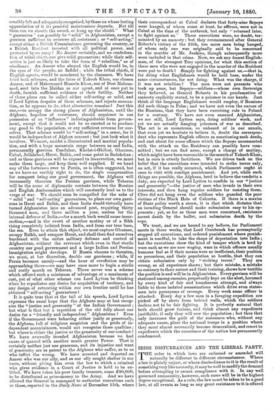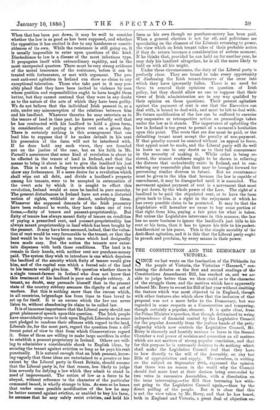IRISH DISTURBANCES AND THE LIBERAL PARTY. T HE order in which
laws are enforced or amended will naturally be different in different circumstances. Where a law is plainly unjust, or where disobedience to it is the result of something very like necessity, it may be well to modify the demand before attempting to secure compliance with it. In any well governed community, however, such cases will be in the highest degree exceptional. As a rule, the law must be taken to be a good law, at all events as long as any great resistance to it is offered When that has been put down, it may be well to consider whether the law is as good as has been supposed, and whether the opposition it has excited is due to any harshness or unsuit- ableness of its own. While the resistance is still going on, it is usually impossible to enter upon questions of this kind. Disobedience to law is a disease of the most infectious type. It propagates itself with extraordinary rapidity, and in the most unexpected quarters. There must be very strong evidence of the moral innocence of the resistance, before it can be treated with forbearance, or met with argument. The pre- sent anti-rent agitation in Ireland can show no claim to any exceptional toleration. Those who take part in it may pos- sibly plead that they have been incited to violence by men whose position and responsibilities ought to have taught them better, but they cannot contend that they were in any doubt as to the nature of the acts of which they have been guilty. We do not believe that the individual Irish peasant is, as a rule, under any misconception of the relations between him and his landlord. Whatever theories he may entertain as to the tenure of land in time past, he knows perfectly well that he has contracted with his landlord to hold a given farm, in consideration of paying a given rent on a given day. There is certainly nothing in this arrangement that can lead him to suppose that if he makes default in his rent his possession of the farm will not be interfered with. If he does hold any such views, they are founded not on the justice of the case, but on his faith in Mr. Parnell's assurances that some kind of revolution is about to be effected in the tenure of land in Ireland, and that the means to bring it about is not to give the landlord his just due. This is not a feeling towards which the law ought to show any forbearance. If a mere desire for a revolution which shall wipe out all debt, and divide a landlord's property among his tenants, were to be accepted in extenuation of the overt acts by which it is sought to effect this revolution, Ireland would at once be landed in pure anarchy. The present disturbances in Ireland have not even a distorted notion of rights, withheld or denied, underlying them. Whenever the supposed demands of the Irish peasantry have been reduced to words, they have taken one of two forms,—fixity of tenure and peasant-proprietorship. But fixity of tenure has always meant fixity of tenure on condition of paying a prescribed rent, and peasant-proprietorship has always meant proprietorship in land which has been bought by the peasant. It may have been assumed, indeed, that the valua- tion of rent would be very favourable to the tenant, or that the land would be to be bought on terms which had designedly been made easy. But the notion the tenants now enter- tain dispenses with both these conditions. The land is to remain in their hands, with neither rent nor purchase-money paid. The system they wish to introduce is one which deprives the landlord of the annuity which fixity of tenure would give him, and of the capital sum which a forced sale of the land to his tenants would give him. We question whether there is a single tenant-farmer in Ireland who does not know that this treatment of his landlord is pure and simple robbery. A tenant, no doubt, may persuade himself that in the present state of the country robbery assumee the dignity of an act of warfare. But this is nothing more than the excuse which, in all countries, brigandage has from time to time loved to set up for itself. It is an excuse which the law can never listen to, without abandoning its claim to be called law. It is of immense importance that the Liberal party should use great plainness of speech uponthis question. The Irish people have unavoidably come to look upon English Liberals as in some sort pledged to condone their offences with regard to the hint Liberals do, for the most part, regard the question from a dif- ferent point of view to that from which Conservatives regard it. Some of them are willing to make large sacrifices in onler to establish a peasant proprietary in Ireland. Others are will- ing to administer a considerable shock to English ideas, by securing the tenant against eviction so long as he pays his rent punctually. It is natural enough that an Irish peasant, know- ing vaguely that these ideas are entertained to a greater or less extent by the Liberal party in Great Britain, should assume that the Liberal party is, for that reason, less likely to judge him severely for defying a law which they admit to stand in need of improvement. The notion of law as a force to be obeyed, without reference to the character of the particular command issued, is wholly strange to him. As soon as he hears that under some possible modification of the law he may be better secured against eviction, or enabled to buy his farm, he assumes that he may safely resist eviction, and hold his farm as his own though no purchase-money has been paid. When a general election is not far off, and politicians are speculating on the chances of the Liberals returning to power, the view which an Irish tenant takes of their probable action if they do return becomes a consideration of serious moment. If he thinks that, provided he can hold on for another year, he may defy his landlord altogether, he is all the more likely to hold on with all his might. Under these circumstances, the duty of the Liberal party is perfectly clear. They are bound to take every opportunity of disabusing the Irish tenant-farmers of the error into which they have ignorantly fallen. There is no need for them to conceal their opinions on question of Irish policy, but they should allow no one to suppose that their views of Irish administration are in any way qualified by their opinion on those questions. Their present agitation against the payment of rent is one that the Executive can deal with, is bound to deal with, and must be left to deal with. No future modification of the law can be suffered to exercise any suspensive or retrospective action on proceedings taken under the law as it stands. The importance of upholding the law in Ireland is too great to permit of a moment's hesitation upon this point. The rents that are due must be paid, or the defaulting tenant must accept the penalty of non-payment. If that penalty cannot be exacted without an appeal to force. that appeal must be made, and the Liberal party will do well to leave no one in any doubt as to their full concurrence in the necessity of making it. While order is being re- stored, the utmost readiness ought to be shown in relieving the distress that undoubtedly exists in Ireland, and in con- sidering any reasonable plan that may be brought forward for preventing similar distress in future. But no countenance must be given to the idea that because the law is capable of amendment, it may be disregarded until it is amended. The movement against payment of rent is a movement that must be put down, by the whole power of the Law. The right of a landlord to be paid the stipulated rent, or to have the farm given back to him, is a right in the enjoyment of which he has every possible claim to be protected. It may be that the Legislature will hereafter see cause to buy some portion of that right from him, paying a fair price for what is taken. But unless the Legislature intervenes in this manner, the law has no more business to ignore the landlord's just title to his rent or his farm, than it has to ignore his title to his pocket- handkerchief or his purse. This is the simple morality of the Anti-Rent agitation, and it is this that the Liberal party ought to preach and proclaim, by every means in their power.



































 Previous page
Previous page